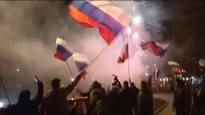Artificial People’s Republics are Russia’s means of influencing Ukraine’s internal affairs.
Russia made a big move on Monday and recognized the so-called Donetsk and Luhansk People’s Republics as independent. Since then, Russia has sent troops to the regions to “secure” them from Ukraine.
What are these areas and what is their recognition?
1. Putin questions the very existence of Ukraine as an independent state
In a heated speech on Monday, President Vladimir Putin claimed that Ukraine historically belongs to Russia.
Russia’s recognition decision will significantly destabilize Ukraine and Europe as a whole.
Promoting the independence of another state is a flagrant violation of the principles of international law.
Putin also reiterated Russia’s disapproval of Ukraine’s accession to NATO.
2. The “rebel areas” of eastern Ukraine are a performance created by Russia
Russia has wanted to create an image of an internal conflict in eastern Ukraine. In reality, Russia has created a war and is its main party.
The so-called rebels hold about a third of the Donbass, ie the Donetsk and Luhansk regions.
The terms are difficult because the “rebel movement” or their leaders are not independent. The separatist territories fought and remained afloat only with Russian support.
Russia has denied its involvement in the war. It says the soldiers fighting the Ukrainian government are volunteers.
The separatist regimes call themselves the People’s Republics of Donetsk and Luhansk. However, no country has recognized them as states – except now Russia.
Ukraine and the rest of the world continue to see the regions as part of Ukraine.
3. Russia created the territories to be able to influence Ukraine
Russia has demanded that the regions be given a veto over Ukraine’s foreign policy decisions, such as applying for NATO membership.
The so-called People’s Republics declared independence in April 2014.
This was preceded by a pro-Western revolution in Ukraine, in which the country’s pro-Russian president was ousted. Russia reacted to the events by illegally occupying Crimea.
With Russian support, pro-Russian protesters then seized administrative buildings in the cities of Luhansk and Donetsk, among others. In May 2014, separatists held a “referendum” on regional independence.
The Minsk agreement agreed in 2015 that Ukraine would give the regions a special status. In return, Ukraine had to regain control of the eastern Ukrainian border. However, the agreement has not kept.
4. Russia has distributed passports to residents, but not everyone wants to join Russia
Russia has emphasized the Russian identity of the inhabitants and the fact that they need Russian “protection” against Ukraine. As part of this propaganda, Russia has recently evacuated residents to Russia.
In eastern Ukraine, the population is mostly Russian-speaking, but there are also people who speak Ukrainian as their mother tongue.
Russia has resolutely increased its influence in the so-called People’s Republics. It has announced that it has granted Russian citizenship to some 800,000 residents to date.
According to the same poll, a majority of residents of the Donetsk and Luhansk regions would like the separatist regions to be returned to Ukraine.
5. It is still unclear which region Russia recognized as independent
Russia may also seek to take over the territories controlled by Ukraine.
Russian government spokesman Dmitry Peskov Russia has now recognized the independence of the territories declared insurgent in 2014, according to the news agency AP.
That would mean that recognition would cover a wider part of eastern Ukraine than the current separatist regions, as Ukraine has since recaptured some of the territories.
Rebel leaders in Donetsk and Luhansk, who pledged recognition of independence on Monday, claimed Ukraine was threatening to recapture the territories. Ukraine denies that this is the case.
5. This is a big turnaround in the tensions that have increased in recent months
Recognition of independence makes it difficult to find a diplomatic solution.
Recognition of independence gives Russia its own “legal” means of sending troops and military equipment to eastern Ukraine. The risk of a wider Russian attack could increase further.
Western countries have warned in advance that recognizing territories is against international law and will respond promptly.
You can discuss the topic until 11 pm on Wednesday, February 23rd.
